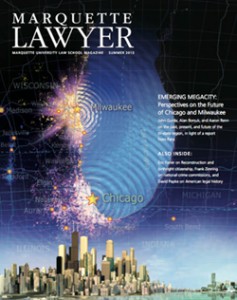The Difficult Pursuit of a Cohesive Approach to the “Megacity” Economy
Metropolitan regional economies are “the most cohesive economies we have,” Charles L. Evans, president of the Federal Reserve Bank of Chicago, says.
But what is it that gives cohesion to the metropolitan region that stretches from the Milwaukee area through Chicago and into northwestern Indiana? And how should the region move forward in a cohesive way?
in a cohesive way?
It’s a tall order to change the way people think, but the Alliance for Regional Development, a non-profit co-chaired by major business figures from Indiana, Illinois, and Wisconsin, is trying to do that. On Dec. 19, it convened a “Summit on Regional Competitiveness” at the Federal Reserve Bank in Chicago.
The effort to foster more cooperation in building on regional strengths in pursuit of greater economic success was spurred in large part by a report released in 2012 by the Paris-based Organization for Economic Cooperation and Development (OECD) which concluded that the Chicago region was growing more slowly than many other economic hubs around the world. The report strongly urged more effort by all involved to work together as a region. It said regions that work together have flourished more than those that do not. The regional alliance was created in the aftermath of that.
The “megacity” effort has been of great interest to Marquette Law School, as well as Marquette University more broadly. In 2012, a conference at Eckstein Hall brought together leading experts and advocates, and that was followed by the Summer 2013 issue of Marquette Lawyer magazine which focused on the subject. Our interest in the regional effort has continued. Professor Charles Franklin, director of the Marquette Law School Poll, and I attended the Dec. 19 conference.


